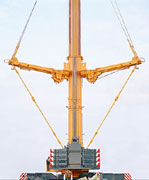 |
A recent judgement over German crane technology could give one global manufacturer a distinct selling advantage. A district court in Mannheim, Germany, ruled on April 2 that Liebherr-Werk Ehingen GmbH violated a key piece of intellectual property developed by Terex-Demag GmbH, a crane producer wholly owned by Terex Corp. of Westport, Conn. Another crane firm, U.S.-owned Manitowoc Crane Group, may face attacks from Terex as well, according to those involved in the trial.
The patent in question is Demags "Sideways Superlift" option, an innovative stability attachment for cranes introduced in 2001. According to company reports, it has been popular for wind-turbine erectors who want telescopic, all-terrain cranes that can set up faster than crawler types but have similar vertical reach and capacity. Several months after Demag's introduction, Liebherr unveiled a similar "Y-Guy" attachment for its all-terrain cranes.
The court decision does not force Liebherr to recall Y-Guy equipment. It also has not yet revealed sales numbers to Terex but will be required to do so under the German court's decision, according to Eric Cohen, Terex senior vice president and general counsel. After that, Liebherr is required to pay the resulting damages, as well as face fines up to €250,000, and up to two years of jail time, for each new unit produced.
 |
| STIFFED? Demag's structural "arms" are subject of German patent litigation |
Klaus Meissner, Demag's director of research and development, says the firm has sold 50 SSLs to date, including nine units in North America. He says the SSL unit features two hydraulically-actuated, cable-suspended truss arms that stiffen booms and double a crane's lifting capacity. The optional device costs about $750,000 on a $3 million crane and is helpful when operating at a high boom angle, low lifting radius and under windy conditions. "The court followed our standpoint that Liebherr is infringing on our patent," Meissner says. "Liebherr was claiming that they were different in how they fold up and erect the system, but I personally believe that in principle they are not different."
Terex officials expect Liebherr to appeal the decision. But for now, the case helps Terex retain exclusivity on specialized technology that it purchased from Siemens, along with Demag's 177-year-old manufacturing business, in 2002. "We think this case is a positive for us," Cohen says.
Observers say that recent spikes in patent litigation, such as for computer software and business methods, is taking its toll on other competitive markets, such as the manufacturing sector. "I think patent litigation is much more high profile than it used to be," says Cynthia M. Ho, law professor and director of Loyola University Chicago's Intellectual Property Program. "It is something that big firms have traditionally always done, but smaller businesses are thinking that they also need to take it into account," she adds.
As a result of today's litigious environment, contractors using a particular type of specialty machinery may be forced to switch to another brand and also pay more for it. "As we've acquired more companies, we have acquired more proprietary-type technology," says Cohen. "Today, it seems that people are tending to use patents as more of a weapon than a defense."
It is likely that Terex-Demag may file another patent complaint in Germany against Deutsche Grove GmbH, a wholly-owned subsidiary of U.S.-based Manitowoc Crane Group and Grove Worldwide. Grove introduced a similar "Mega Wing-Lift" device last May at the Intermat exhibition in Paris. "We will wait to see their response to this latest event, and decide whether it is appropriate for us to pursue that," Cohen says.
Both Liebherr and Grove declined to comment on the April 2 decision.
(Photos courtesy of Terex-Demag GmbH)

Post a comment to this article
Report Abusive Comment